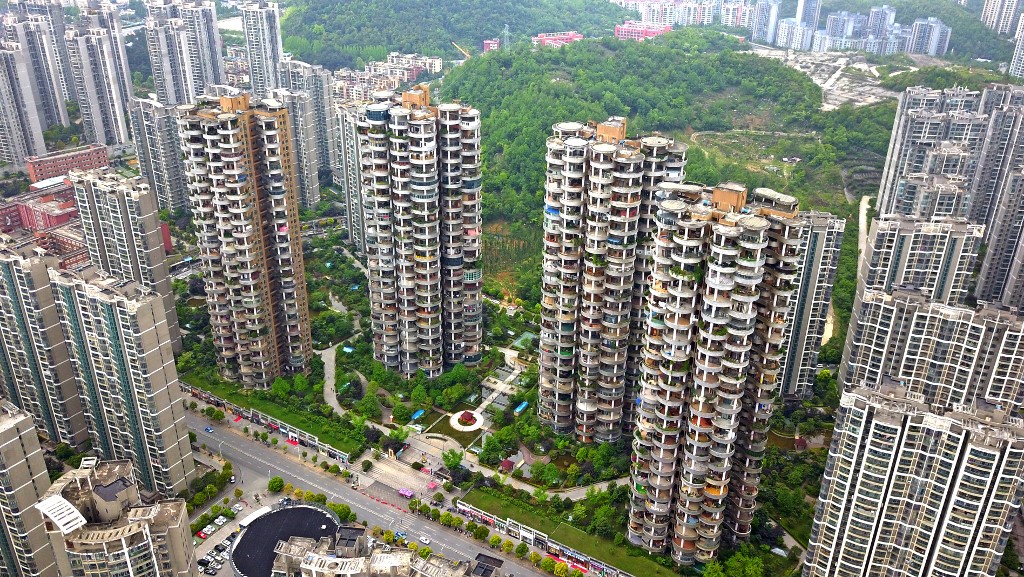The government’s move to reduce huge debt levels among real estate developers has hit their stock prices and is expected to force greater industry consolidation in the months ahead, as land auctions are restricted and home sales begin to cool down
(AF) After China’s property sales hit a record high last year despite Covid-19, the frenzy continued to expand this year with a 16.7% two-year average growth figure in the first five months. On the other hand, China’s property index has plummeted to a close to a 10-year low as Beijing’s deleveraging reform and rising land costs put pressure on property firms’ growth and profits.
However, global investors such as Blackstone are still confident of the long-term prospects of China’s property market. Earlier this month, Blackstone agreed to purchase a 55% stake in SOHO China, one of China’s largest commercial real estate developers, for HK$23.7 billion ($3.05 billion).
Data released by China’s National Bureau of Statistics earlier this month showed that property sales were up 52% from January to May this year compared with a year earlier, albeit from a low base. Residential property recorded the highest growth of 56% during the period, followed by offices at nearly 25% and commercial spaces at 10%.
If sales from the same periods in both 2019 and 2020 are taken into account the two-year average growth rate was 16.7%.
Country Garden took first place with sales of 350 billion yuan ($54.2 billion) in the first five months, and developers including Evergrande, Vanke, Sunac, plus Poly Developments and Holdings each recorded sales of over 200 billion yuan ($31 billion).
In stark contrast with the property firms’ soaring sales are their declining stock prices.
As of Sunday June 27, Wind’s property index had declined just over 7% this year, making property the sixth worst-performing sector of China’s 28 top industry sectors. By comparison, the SSE Composite Index rose 3.87% over the same period.
In terms of valuation, the property sector was only ahead of the banking and architectural decoration of all 28 market sectors, according to research by Guosen Securities.
Shenzhen-listed shares of Vanke have been declining for four months, and closed at a 30-month low of 24.08 yuan ($3.70) on Monday.
Shanghai-listed shares of Poly Developments and Holdings closed at 12.13 yuan ($1.90) on Monday, which was the lowest since July 2019.
To boost their market values, many property firms have bought back their shares or increased major shareholders’ stakes in firms. Last month, Binjiang Real Estate, The Wharf (Holdings) Ltd, and Central China Real Estate joined a long list of firms doing share buybacks.
Last year witnessed increases in both home sales volume and amount as credit policies remained loose overall, and investments that were reduced overseas due to the pandemic returned to the domestic market.
Move to deflate real estate bubbles
However, since the second half of last year, Beijing’s policies aimed at curbing real estate bubbles have limited the expansion of the developers.
Under President Xi Jinping’s instruction that stresses stability, “houses are built to be lived in, not for speculation.” Since China’s real estate sector took approximately 40% of total financing in the economy in 2016, according to the UK-based Royal Institute of Chartered Surveyors, it is a prime target for the state deleveraging campaign.
The government introduced a “three red-lines” policy to downsize property firms’ books and debt ratios via these three metrics. Banks were required to cap loans to property firms and mortgages to home buyers. And to better regulate land sales in 22 key cities, local governments will hold land auctions on just three days each year, rather than on more days throughout the year as has been the usual practice.
These measures are starting to show results. Loans for real estate rose 4% year-on-year in the first quarter of this year, slowing from 10% year-on-year 12 months ago and much lower than the overall economic growth of 18.3%.
Growth rates in loans, trusts and bond issuance for property development were at their slowest
in May, Fitch Ratings has observed.
Challenges to obtain external funding have pushed developers to rely more on internal funding, or funds from property sales, to finance the development of new projects, analysts from Fitch said. The portion of internal funding increased to 55% of total funds available for development in May, from 36% in 2011, according to the National Bureau of Statistics. In contrast, the share of external funding, such as loans, bonds, trusts and equities, declined.
At the same time, property sales growth is also slowing – down 15.8 percentage points in the
first five months compared with the first four months.
At the same time, property sales are also slowing – down 15.8 percentage points in the first five months compared with the first four months.
“The rise in sales volume and prices of commercial properties in the first half of this year was driven by hedging activities under the pressure of inflation. Therefore, the rise occurred most in the central and popular districts in the first and second tier cities. The markets in the third and fourth tier cities were not as heated,” Kevin Bai, vice chairman of China Enterprise Capital Union, said.
Bai said it is unlikely for China to witness another record high in property sales this year given governments’ crackdown on housing speculation and the rising interest rates.
Most analysts expect property firms’ growth to decline now that they cannot expand quickly by taking on debt. Their profits are also expected to decrease as rising land prices put pressure on their profit margins.
According to research by Industrial Securities, the average net profit margin of China’s listed property firms declined by 1.9 percentage points last year to 7.3%, and declined even more in Q1 – by 3 percentage points to 4.3%.
Analysts from Industrial Securities expect China’s property sales to move downward soon and they anticipate a 3% decline in the overall sales volumes for 2021.
“With the impact of sales declines, earnings pressure and tight financing, the diverging of the property firms is likely to accelerate. Weak players will be forced out of business,” analysts from Industrial Securities said.
Developers prioritise churn
Beijing’s deleveraging reform has pushed property developers to seek to sell properties faster so as to use to proceeds to fund new projects, analysts from Fitch have observed.
The sales churn is influenced by various factors, including product type, management strategy, and geographic diversification.
Developers with lower churn rates tend to have weaker credit profiles and vice versa, Karl Shen and several others from Fitch said. They expect tight credit conditions to continue “in the next few years”.
“Future credit conditions will continue to be tight as policies will restrain developers from increasing borrowings, push them to boost sales churn, and refrain from aggressive land acquisitions as well,” the Fitch analysts said in a report on Tuesday.
Meanwhile, Blackstone agreed to purchase a 55% stake in SOHO China from founder Pan Shiyi earlier this month, in a deal that valued the company with a 16.7% discount from an earlier offer in March 2020.
Analysts said Blackstone’s move signals the American investment group’s confidence in the growing demand for serviced office spaces as China’s economy continues to recover from the pandemic. The private equity firm led by American billionaire Stephen Schwarzman is adept at buying distressed real estate firms, improving them, and then selling them for a significant premium over the purchase price.
Mergers and acquisitions between China’s listed property firms are likely to happen in the second half and will make the industry more concentrated, Bai from China Enterprise Capital Union forecast.
“The small- and medium- sized property firms and those without any distinctive advantages will either have to transition to new business models that do not involve property development, or switch to develop joint-venture projects with the larger firms. The firms that can obtain low-cost financing and consolidate business capabilities, such as large-sized state-owned property firms, will become the winners. The firms that specialize and excel in niche areas will also have advantages,” he said.
This story was updated on June 30 with information from further reports.
ALSO SEE:
China’s land sale limits will push property sector consolidation: Moody’s
China pushes for property tax to rein in runaway home prices
Chinas “grey-rhino” property market could trigger subprime-like crisis























